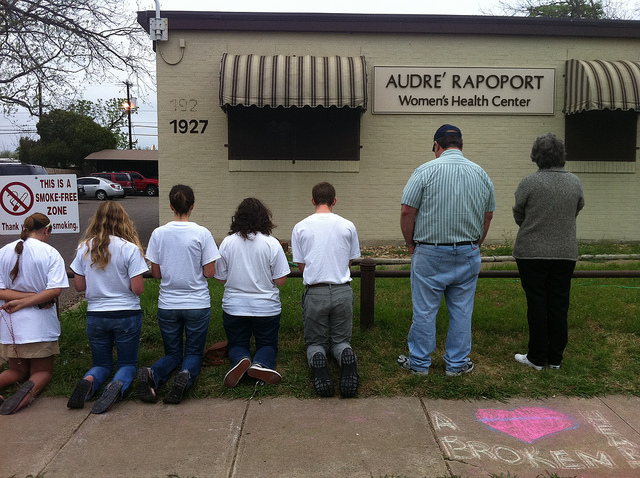
Protesters in Waco, Texas pray in front of the Planned Parenthood Audre Rapaport Women’s Health Center in 2011. The Center has since stopped providing abortions due to new Texas regulations currently under judicial review. Picture via John Pisciotta (Flickr)
August in the American South is a hot and humid affair, and this summer has seen the added heat of ferocious abortion access wars in the region.
Last month, federal judges in Alabama, Texas, and Louisiana struck down or put on hold new regulations that would have closed the majority of remaining abortion clinics in their respective states. On August 4, United States District Judge Myron H. Thompson ruled unconstitutional an Alabama law requiring all doctors who perform abortions to secure admitting privileges at local hospitals. On August 29, Judge Lee Yeakel nixed the application of a similar statute in West and South Texas while also striking down a statewide restriction that imposes strict building standards (known as ambulatory surgical center requirements) on abortion clinics — forcing them to choose between spending vast sums of money on extensive renovations or closing for good. And just two days ago, on August 31, Judge John deGravelles temporarily delayed the enforcement of a Louisiana admitting privileges law that, if implemented, would shut down three of the state’s five abortion clinics.
All three of these rulings provide a much-needed reprieve to a rather creative strategy employed by the lawmakers of those states: if the Constitution prohibits legislating what a woman can do with her womb, then target the people and the institutions that would help her carry out her decision instead. Specifically, anti-choice legislators have recognized that they can make it nearly impossible for such healthcare providers to continue operating by making them jump over increasingly high and arbitrary hurdles in the name of women’s safety. While in theory, patient safety is a perfectly legitimate state goal, a closer examination of how these laws would actually work reveals how painfully little they have to do with standards of care.
A physician with admitting privileges to a specific hospital is authorized to admit patients into that facility for treatment. By mandating that all abortion doctors obtain this privilege, the state supposedly ensures that if an abortion procedure goes wrong, the doctor can personally admit the patient to the hospital for emergency care.
As RH Reality Check has noted, however, this hypothetical scenario rarely coincides with reality: in the unusual occurrence of abortion complications, accepted medical protocol calls for the doctor to summon an ambulance to take the patient to a hospital, and the EMT — not the abortion provider — makes the decision as to where the patient will be admitted. Once the patient reaches the hospital, on-site staff are able to admit her for immediate medical attention. For this reason, doctors’ organizations such as the American Medical Association and the American College of Obstetricians and Gynecologists have opposed these laws, plainly stating, “[T]here is simply no medical basis to impose a local admitting privileges requirement on abortion providers … the care a woman receives at the emergency room is independent of, and not contingent on, her abortion provider having admitting privileges.” Furthermore, as Judge Thompson found in the Alabama case, hospitals can and often do refuse to grant the necessary privileges to abortion providers who attempt to comply, leaving doctors with the unfortunate choice of losing their licenses and getting hit with criminal charges, or closing down.
It is likewise unclear how requiring all abortion clinics to become ambulatory surgical centers would improve patient safety. As Judge Yeakel wrote of the Texas law, the application of ambulatory surgical center standards–originally authored to regulate centers that perform higher-risk procedures such as hernia repair and colonoscopies–would make abortion facilities reassess and overhaul their “electrical, heating, ventilation, air conditioning, plumbing, and other physical plant requirements as well as staffing mandates, space utilization, minimum square footage, and parking design.” They would apply even to clinics that administer only medication abortions, which involve the ingestion of oral medicine and require no surgery or other invasive procedures on the patient’s body. Moreover, while other kinds of ambulatory surgical centers have been “grandfathered” or otherwise exempted from these requirements, the Texas restriction specifically bars any grandfathering or waivers for abortion clinics. Unsurprisingly, the majority of these clinics lack the funds to bring their facilities into compliance with the new law.
The State of Texas clarified its true intentions when it argued before Yeakel that even if its regulation ended up shutting down an El Paso abortion facility (the only one remaining in West Texas), women in that area could simply obtain the procedure by traveling to New Mexico – a state with far less stringent building standards for abortion clinics. Judge Yeakel is rightfully incredulous at this suggestion: “If the State’s true purpose in enacting the ambulatory-surgical-center requirement is to protect the health and safety of Texas women who seek abortions, it is disingenuous and incompatible with that goal to argue that Texas women can seek abortion care in a state with lesser regulations.”
The reality is that women’s health and safety are merely smokescreens for these restrictions, of which the actual purpose is to chip away at abortion access until nothing remains. As it is, the laws in Texas, Alabama, and Louisiana would shutter over half of their existing clinics and force women – especially women in low-income and rural areas – to undertake increasingly longer journeys for legal abortions. In Texas, the number of abortion providers would dwindle to eight at most, while the number of women who must travel over 50 miles to reach a licensed facility would shoot up from around 800,000 to 1.6 million, as Yeakel’s opinion notes. And in Alabama, the court found that three of the state’s five abortion providers are currently blocked by local hospitals from obtaining admitting privileges. Should the law be implemented, this leaves only two facilities open for over one million Alabaman women of reproductive age.
Applying the United States Supreme Court’s “undue burden” standard, which asks whether state regulations have the “purpose or effect of placing a substantial obstacle in the path of a woman seeking an abortion of a nonviable fetus,” Judge Thompson ruled the Alabama restriction unconstitutional. Likewise, Judge Yeakel concluded that the Texas admitting privileges law and the ambulatory surgical center requirements, acting in tandem, created a substantial obstacle for women throughout the state. Judge deGravelles, meanwhile, barred enforcement of the Louisiana law pending a further hearing, granting doctors there more time to acquire admitting privileges.
Of course, these victories may prove to be ephemeral. Alabama will appeal Judge Thompson’s decision to the Eleventh Circuit Court of Appeals, and the next stop for the Texas regulations is the Fifth Circuit, which has recently sent mixed signals as to how it might rule on such regulations. In March of this year, the Fifth Circuit upheld the Texas admitting privileges law on its face, stating that increased travel distances alone did not constitute an undue burden on women seeking abortions. The same court, however, struck down Mississippi’s admitting privileges law in July after finding that the limitation would close down the state’s only abortion clinic. How it responds to Judge Yeakel’s latest decision, which brings in the added complication of the ambulatory surgical center requirements, remains to be seen.
Even if these district court decisions reach the Supreme Court intact, opponents of the laws may yet find themselves in trouble. Justices Ginsburg, Breyer, Sotomayor, and Kagan will presumably side against the states and deem their restrictions unconstitutional, but the clinics will likely face an uphill battle convincing Chief Justice Roberts and Justices Scalia, Thomas, and Alito to find an undue burden. This leaves Justice Kennedy as the deciding vote – and in past abortion rulings, he has exhibited a paternalistic approach toward women’s decision-making abilities. In the majority opinion for 2007’s Gonzales v. Carhart, which upheld a federal ban on partial birth abortion, Justice Kennedy famously stated: “While we find no reliable data to measure the phenomenon, it seems unexceptionable to conclude some women come to regret their choice to abort the infant life they once created and sustained.” This patronizing desire to “save” women from their own life choices could very well translate into sympathy for Alabama and Texas’ arguments regarding women’s health and safety.
In the meantime, the district court rulings of these past weeks provide supporters of abortion access with a brief but welcome respite from the ongoing assault against Roe v. Wade, which can feel like a game of “whack-a-mole” or a battle with the Hydra. For every limitation that a federal judge casts aside as an undue burden, a conservative legislature lays down another one or two from a seemingly endless arsenal of obstacles. As this particular dispute reaches a boiling point, all women can do now is wait.
·
 Victoria Kwan is a Blog Editor for The Brooklyn Quarterly.
Victoria Kwan is a Blog Editor for The Brooklyn Quarterly.
